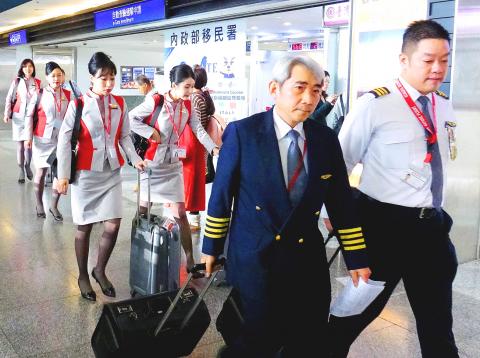Far Eastern Air Transport Corp (FAT, 遠東航空) is to halt operations from today due to long-standing losses and difficulty repaying loans, company vice president Huang Yu-chi (黃育祺) said yesterday.
The 62-year-old airline, which launched Christmas sales two days ago, made the announcement after it could not honor interest and principal payments on two short-term loans, Huang told a news conference in Taipei.
“The situation unfolded so suddenly that employees feel like they are in a nightmare,” he said, adding that management “are shocked, too.”

Photo: Chu Pei-hsiung, Taipei Times
FAT, which has 1,008 employees, would cancel all flights from today, he said.
It had notified the Taipei Department of Labor, he said.
An internal letter indicated that FAT planned to lay off its staff, Huang said, adding that it would do its best to protect employees’ rights while discussing labor issues with regulators.
FAT, which operated 62 routes to 47 destinations, focused on operations in the outlying counties of Penghu and Kinmen, as well as second-tier cities in China, including Hefei, Xiamen and Haikou, company data showed.
The closure came as no surprise to people in the aviation industry, a manager at another airline said on the condition of anonymity.
Although competition in the nation’s aviation market is tense, FAT’s failure has a lot to do with bad business strategy, he said.
FAT used old aircraft, which have poor fuel efficiency, the manager said, adding that it depended heavily on cooperation with travel agencies to offer charter services for groups, which has a low profit margin.
The average age of FAT’s fleet of 11 jets was 18.6 last year, much older than the industry average of 7.7, Civil Aeronautics Administration data showed.

CHAOS: Iranians took to the streets playing celebratory music after reports of Khamenei’s death on Saturday, while mourners also gathered in Tehran yesterday Iranian Supreme Leader Ayatollah Ali Khamenei was killed in a major attack on Iran launched by Israel and the US, throwing the future of the Islamic republic into doubt and raising the risk of regional instability. Iranian state television and the state-run IRNA news agency announced the 86-year-old’s death early yesterday. US President Donald Trump said it gave Iranians their “greatest chance” to “take back” their country. The announcements came after a joint US and Israeli aerial bombardment that targeted Iranian military and governmental sites. Trump said the “heavy and pinpoint bombing” would continue through the week or as long

TRUST: The KMT said it respected the US’ timing and considerations, and hoped it would continue to honor its commitments to helping Taiwan bolster its defenses and deterrence US President Donald Trump is delaying a multibillion-dollar arms sale to Taiwan to ensure his visit to Beijing is successful, a New York Times report said. The weapons sales package has stalled in the US Department of State, the report said, citing US officials it did not identify. The White House has told agencies not to push forward ahead of Trump’s meeting with Chinese President Xi Jinping (習近平), it said. The two last month held a phone call to discuss trade and geopolitical flashpoints ahead of the summit. Xi raised the Taiwan issue and urged the US to handle arms sales to

State-run CPC Corp, Taiwan (CPC, 台灣中油) yesterday said that it had confirmed on Saturday night with its liquefied natural gas (LNG) and crude oil suppliers that shipments are proceeding as scheduled and that domestic supplies remain unaffected. The CPC yesterday announced the gasoline and diesel prices will rise by NT$0.2 and NT$0.4 per liter, respectively, starting Monday, citing Middle East tensions and blizzards in the eastern United States. CPC also iterated it has been reducing the proportion of crude oil imports from the Middle East and diversifying its supply sources in the past few years in response to geopolitical risks, expanding

Pro-democracy media tycoon Jimmy Lai’s (黎智英) fraud conviction and prison sentence were yesterday overturned by a Hong Kong court, in a surprise legal decision that comes soon after Lai was jailed for 20 years on a separate national security charge. Judges Jeremy Poon (潘兆初), Anthea Pang (彭寶琴) and Derek Pang (彭偉昌) said in the judgement that they allowed the appeal from Lai, and another defendant in the case, to proceed, as a lower court judge had “erred.” “The Court of Appeal gave them leave to appeal against their conviction, allowed their appeals, quashed the convictions and set aside the sentences,” the judges